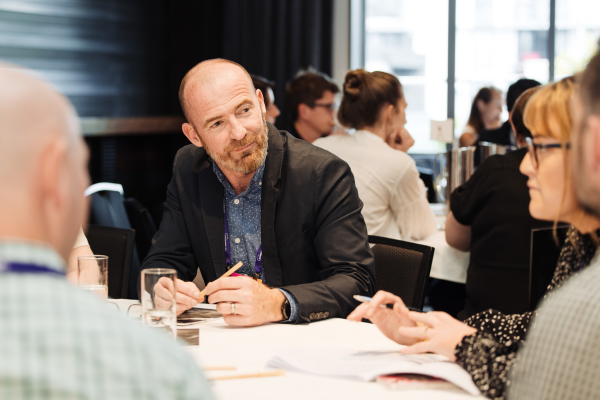 Communication and transparency
Communication and transparency
- Clear and honest conversations: maintain open and honest communication with your team. Avoid creating information vacuums that can lead to workplace gossip and anxiety.
- Multiple channels: use various communication channels to ensure messages reach everyone, considering different preferences and needs.
Hustle Group Director and Futurespace keynote speaker Anton Matthews said leaders must lead with openness and honesty when we asked him about leadership in the lead up to the conference:
“When things aren’t going well, you look to your leaders to assume authority – you want them to step up, lead by example and give direction. Your tribe will follow you when you show that you are values-driven and your actions line up with your words. You need to bring that human aspect to the table.
“The leader’s job is to motivate people to be the best version of themselves. They must work out what makes each person tick, and then do what’s needed to bring out the best in that person and create an environment that allows them to experience success.”
Engagement and inclusivity
- Team involvement: engage employees in the decision-making process and encourage their input. This helps them feel valued and invested in the organisation’s direction.
- Diverse perspectives: gain input from diverse sources and be open to different views, balancing this with decisive leadership.
Read the Diversity Agenda’s interview with Abley Associate Director – Transportation and Safe Systems Matthew Noon about the importance of inclusive leadership in today’s workplaces and how to foster a diverse and supportive team.
Resilience and adaptability
- Scenario planning: keep up to date with upcoming changes and engage in scenario planning to prepare for different outcomes. Ensure your risk register and business continuity plan are up to date.
- Flexible workforce: develop a flexible workforce with multiple skill sets to adapt to changing demands and market conditions. Check out The Pillars Competency Framework, which identifies the most critical non-technical skills and competencies required to thrive as a professional services consultant, and our example flexible working policy.
Innovation and training
- Embrace technology: lead by example in adopting new technologies like AI with good policies and processes in place to ensure responsible and ethical use. Provide training and support to help your team upskill and adapt.
- Encourage innovation: create a safe space for staff to suggest innovative ideas and test new approaches. Share successful outcomes to inspire further innovation.
Read our interview with Enea Sermasi, Politecnica Partner Engineer – Head of International Business Development, about how to prepare your company for an AI future.
Well-being and support
- Regular check-ins: conduct regular well-being check-ins to monitor and support team members’ mental health. Read more about Mindspace’s tools and resources to help you have a thriving mentally healthy workplace.
- Empathy and authenticity: lead with empathy and authenticity, acknowledging the human aspect of change and providing reassurance without sugarcoating the situation.
Vision and stability
- Set a clear vision: establish a clear vision for the future and communicate it effectively to the team. This helps provide direction and purpose during uncertain times.
-
Maintain core values: simplify operations and focus on core values, especially during tough times, to maintain stability and consistency.
